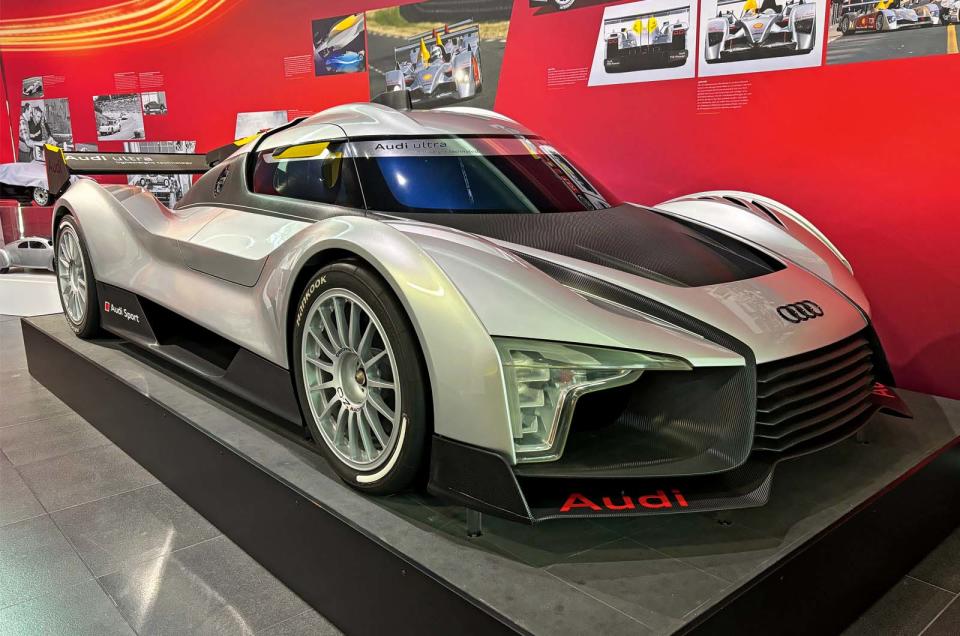Long-lost Audi hypercar revealed as brand plots sports car future

Audi is shaping the electrified future of its top-drawer RS performance models and could deploy learnings from its nascent Formula 1 programme in a range- topping, road-going supercar.
The firm has just quietly revealed a never-made hypercar concept from 2013, which is no longer a live project but gives a strong indication of how the brand’s motorsport efforts could influence future sports cars.
Making its belated debut in a new aerodynamics exhibition at Audi’s museum in Ingolstadt, Germany, the Scorpion was conceived as a flagship supercar to sit above the Audi R8, with heavy design and technical influence from the company’s successful endurance sports car racers.
Obvious cues – most notably from the R18 E-tron Le Mans racer – include the large stabilising fin along the rear deck, gaping aero tunnels and downforce-optimising carbon bodykit. Audi also cites the aero influence of its DTM touring cars.
While no technical details of the Scorpion show car have been given, Autocar reported in 2013 that Audi was working on a hypercar with a 600bhp diesel-electric powertrain in place of the pure-electric R8 E-tron it had decided to shelve.
The exclusive super-hybrid, dubbed ‘R10’, was planned to “provide a direct link between Audi’s motorsport activities and the road car side”.
In reality, neither car was brought to production and Audi categorically says development of the Scorpion “will not be continued”.
But the firm’s entry into Formula 1 from the 2026 season could open the door to a new racing-inspired halo car in the same vein, much as it has for Audi’s soon-to-be F1 rivals, Mercedes-AMG, Red Bull and Aston Martin.
Asked about his appetite for such a model as a brand- building tool and R&D outlet, Audi CEO Gernot Döllner gave a vague response: “We are in a much broader discussion to see where in our portfolio we can come up with emotional vehicles.”
But he did say the company is “working on how that strategy could look”, in light of the retirement of the R8 halo supercar last year, and while it is “way too early” to discuss details, he said: “The philosophy of Formula 1 and our RS models, especially the ones with a combustion engine: that fits perfectly – having a performance- oriented hybrid strategy.”
Asked by Autocar if Audi planned to promote a genuine ‘race to road’ relationship between its F1 exploits and road cars, Döllner said the company would be more likely to take overarching learnings about high-output hybrid systems and R&D, rather than technical influence, from its race programme. “You have to be honest: it’s really an efficiency task,” he said. “You go through and learn how to make an electric motor efficient, but it’s a totally different technology.
“You have a high-rev combustion engine in combination with an electric motor that turns 60,000 times per minute, and a gearbox that changes the gear in 0.05sec – two gears in motion at the same time, so that’s quite another story.
“But it brings the mindset to the company. That’s the important part. The efficiency mindset, the racing spirit, the team set-up – that, to me, is the more important part of it.”
The new Audi RS5–a replacement for the RS4 – is due on sale next year as Audi Sport’s first plug-in hybrid, combining a petrol V6 with a rear-mounted EV motor, four-wheel drive and more than 440bhp. The performance division will also expand its pure-electric line-up in the coming years with RS versions of the new A6 and Q6 E-tron.
But several months after the retirement of the R8, it remains unclear how Audi plans to top its increasingly electrified sports car line-up. These latest comments could be the first sign that combustion will continue to play a role.
]]>

 Yahoo Autos
Yahoo Autos 